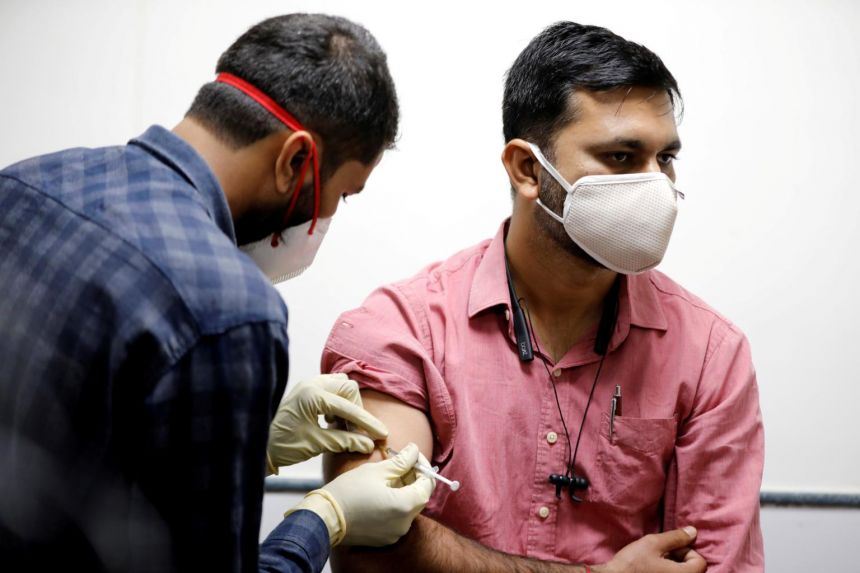India starts putting COVID-19 vaccine plan in place
NEW DELHI — India is gearing up for one of the biggest Covid-19 vaccination drives in the world, with 300 million people expected to receive doses in the first phase lasting till July.
They will include doctors, nurses and other front-line workers, such as the police and municipal workers, and those above 65.
The federal health ministry has released guidelines asking that 100 people be vaccinated a day at each vaccination center.
With India looking at half a dozen vaccine candidates, the federal government is also encouraging states to choose one vaccine per district to simplify what is expected to be a mammoth exercise rivaling how the country of 1.35 billion prepares for elections.
Indian media reported that health officials are also looking at using polling booths and wedding halls as vaccination centers.
Article continues after this advertisementThe country has yet to approve any vaccine for emergency roll-out.
Article continues after this advertisement“The broad guidelines have been shared with the states. Orientation (for health workers and district officials) and training has started. States are now moving towards action,” said Dr V. K. Paul, a member of the National Institution for Transforming India, the Niti Aayog, at a press conference on Tuesday (Dec 15).
Mindful of a potentially growing anti-vaccine movement in India, the government has started on an awareness campaign to dispel doubts about the Covid-19 vaccine.
In a set of guidelines released last week, the federal government asked states to ensure “factual and timely” information is shared with people to dispel apprehension arising from the short clinical trials, fear of adverse events, and misconceptions and negative rumors shared on social media.
Centers are also being set up across the country to deal with any potential adverse reactions from the vaccine.
India is the world’s second-worst affected country after the US, with over 9.88 million coronavirus cases. Cases have spiked in different parts of the country although overall numbers have been falling over the past few weeks. Fewer than 22,100 new cases were registered on Monday, compared with over 90,000 cases per day in mid September.
So far, three groups have applied for emergency approval for the vaccines – Pfizer, the Serum Institute of India for the Oxford-AstraZeneca vaccine, and Bharat Biotech for its Covaxin. Government officials said the Drugs Controller General of India was examining the three vaccines for emergency use.
This week, the controller gave clearance for clinical trials for one more candidate, by Gennova Pharmaceuticals, which is based in the city of Pune, in association with India’s Department of Biotechnology, Dr Paul said.
One challenge facing the roll-out is whether capacities like cold storage can be ramped up within the short time frame.
However, experts noted that the South Asian country’s ability to handle large numbers during routine immunization would help.
“This is an incredibly complex operation for any country, particularly given India’s size and diversity… There’s certainly a potential for a plethora of questions and concerns both among healthcare staff as well as community members; the importance of and need to pay attention to communication strategies cannot be overemphasized,” said Professor Rajib Dasgupta, chairman of the Centre for Social Medicine and Community Health at the Jawaharlal Nehru University.
According to a study by the Federation of Indian Chambers of Commerce and Industry, and Ernst and Young, the country needs an estimated 130,000 to 140,000 vaccination centers, 100,000 healthcare professionals to carry out the inoculations, and 200,000 volunteers.
The study noted that government facilities could be further augmented by the private sector in states with weaker health infrastructure like Odisha, Bihar, Jharkhand, West Bengal, Uttar Pradesh and Madhya Pradesh.
For now, the plan looks good – on paper.
“The government is well prepared in practical terms but I expect many a slip between the cup and lip,” noted epidemiologist Dr T. Jacob John, who said many questions would arise including over the choice of beneficiaries.
For more news about the novel coronavirus click here.
What you need to know about Coronavirus.
For more information on COVID-19, call the DOH Hotline: (02) 86517800 local 1149/1150.
The Inquirer Foundation supports our healthcare frontliners and is still accepting cash donations to be deposited at Banco de Oro (BDO) current account #007960018860 or donate through PayMaya using this link.
